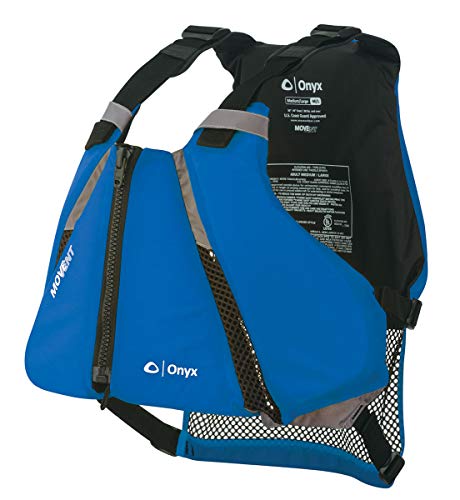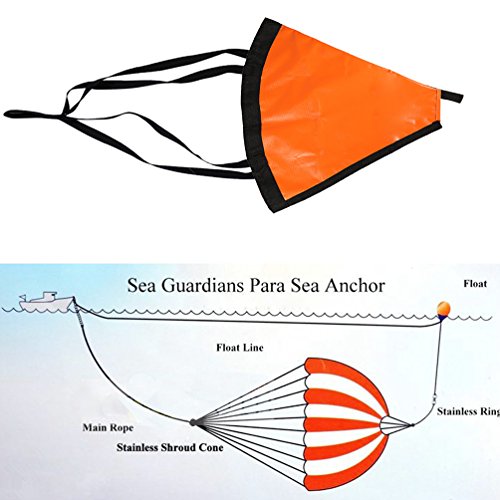You’ve no doubt seen them on the water: one or two seats and a trolling motor, suspended by a pair of floating tubes. Otherwise known as an inflatable pontoon boat.
These boats are great for anglers that go out alone or in pairs. Perhaps you’re considering buying one yourself. But before you do, you have a few questions:
Are inflatable pontoon boats really safe in the water?
Do they capsize easily?
And are there any safety tips to keep in mind while operating an inflatable pontoon boat?
Keep reading!
In this article, we’ll take a closer look at all of these questions.
Table of Contents
- Are Pontoon Boats Dangerous?
- Can a Pontoon Boat Capsize?
- What Are Some Tips for Safely Operating a Pontoon Boat?
- 1. Wear a Life Vest
- 2. Take a Repair Kit and Hand Pump
- 3. Take a First Aid Kit
- 4. Take a Set of Oars
- 5. Evenly Distribute the Weight
- 6. Know the Weight Limit
- 7. Know How Deep/ Shallow Your Pontoon Boat Can Go
- 8. Know How Far Out Your Pontoon Boat Can Go
- 9. Let Someone Know Your Plans
- 10. Keep an Eye on the Weather
- Conclusion
Are Pontoon Boats Dangerous?

When it comes to safety, inflatable pontoon boats are much like any other type of boat. How safe they are depends on how you operate them and where you operate them.
Pontoon boats are perfectly safe as long as you are using them correctly and under the proper weather conditions.
That said, it’s important to know how and where you can safely use an inflatable pontoon before buying one.
There are two main reasons pontoon boats might be considered dangerous if they are used improperly:
- Their design makes them prone to tipping over in rough waters.
- The inflatable air chambers can be easily punctured if dashed against rocks or other underwater obstacles.
As long as you take precautions to avoid rough waters and rocky areas, as well as prepare for accidents, you shouldn’t have to be concerned about safety when you’re out in an inflatable pontoon. These boats are actually quite buoyant under the right conditions.
Can a Pontoon Boat Capsize?
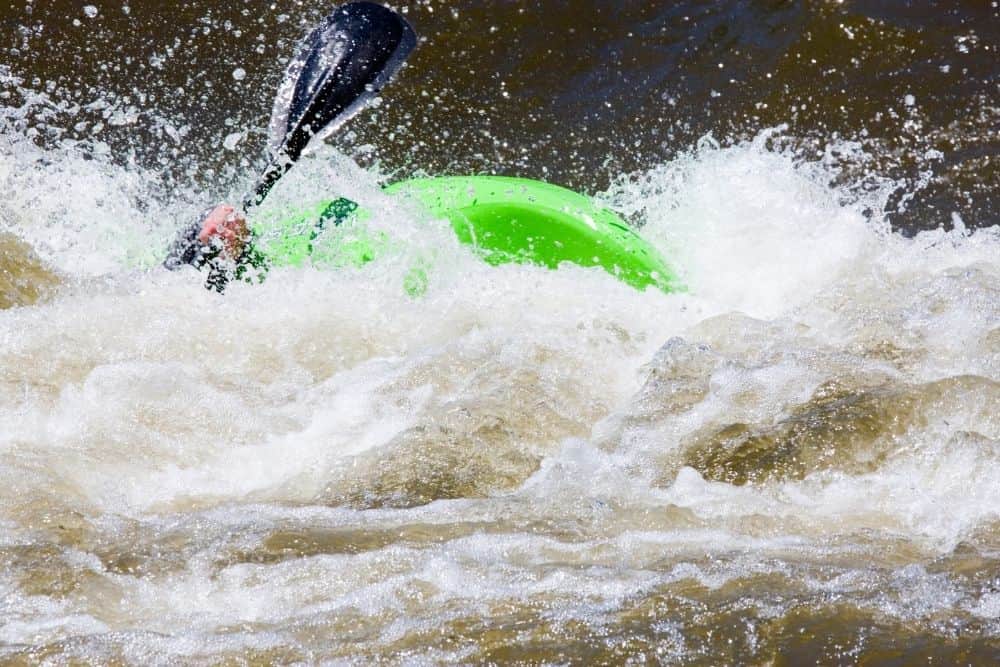
As mentioned above, certain conditions may cause inflatable pontoon boats to become unstable, to tip over, and even to sink. So yes, it is possible for pontoon boats to capsize.
Of course, under the right conditions, it’s possible for any boat to capsize. The important thing is knowing what conditions may cause a capsize and endeavoring to avoid those conditions. It’s also good to be prepared should any accidents occur.
Even mildly choppy waters may cause inflatable pontoons to capsize. They are meant for calm waters on calm days. It’s best to avoid going out on the water if there is a chance of encountering high winds or thunderstorms.
Ocean waters, in particular, can be unpredictable and rough. If you take your pontoon boat out in the ocean, be sure and stay within sight of the shore, and only go out on calm, sunny days.
Another circumstance that may cause your pontoon to capsize is when the weight of gear, passengers, and equipment is not distributed evenly. Pontoon boats are highly buoyant, but their design makes them prone to tipping if the weight they carry isn’t balanced properly.
Always make sure to evenly distribute the weight. Store your gear in the proper storage areas, sit in the proper seats, and make sure you’re not exceeding your boat’s weight limit.
It’s also a good idea to perform regular maintenance checks on your inflatable pontoon. Always check for air leaks, rust and corrosion before and after each boating trip.
If you have a trolling motor or other equipment mounted to the boat, check these devices as well to make sure they are in good working order.
If possible, you should also check the boat for damage if you encounter any underwater obstacles or become tangled in a fishing line or seaweed.
During the winter, store your boat in a secure location out of the weather.
Regular and proper maintenance is one of the best ways to prevent problems from arising in the first place.
What Are Some Tips for Safely Operating a Pontoon Boat?
So, avoiding choppy waters is important, and performing regular maintenance is equally as important.
What other precautions can you take to ensure a safe and enjoyable day in your inflatable pontoon boat?
1. Wear a Life Vest
If you’ve done any amount of boating, you know that wearing a proper flotation device is mandatory even in calm waters. And with good reason.
You and anyone else in your inflatable pontoon should wear a life vest at all times. Not only will this help you stay afloat if the boat capsizes, it will also keep you safe if you should happen to fall out of the boat.
2. Take a Repair Kit and Hand Pump
Even if you plan to keep your pontoon away from known obstacles, there’s no way of knowing for sure what may be lurking out of sight under the water.
Remember, inflatable pontoons may lose air if they are damaged, which may cause the boat to sink. Most inflatable pontoon boats will come with a repair kit, and you can buy extras for a relatively cheap price.
Keep at least one or two repair kits with you every time you go out on the water. That way, if you need to, you can make repairs on the spot. Keeping a hand pump will also allow you to re-inflate your pontoon after you’ve repaired the leak.
3. Take a First Aid Kit
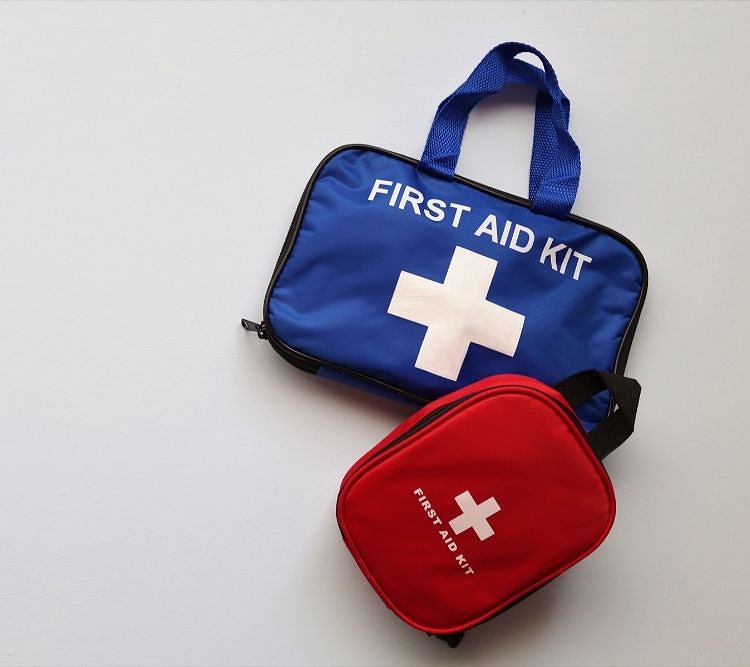
It’s always a good idea to keep some basic first aid supplies with you in the boat. You never know when you may snag a finger on a fish hook or experience a sunburn.
Having a first aid kit will allow you to deal with small injuries and will also provide a bit of assurance should you run into any bigger problems.
4. Take a Set of Oars
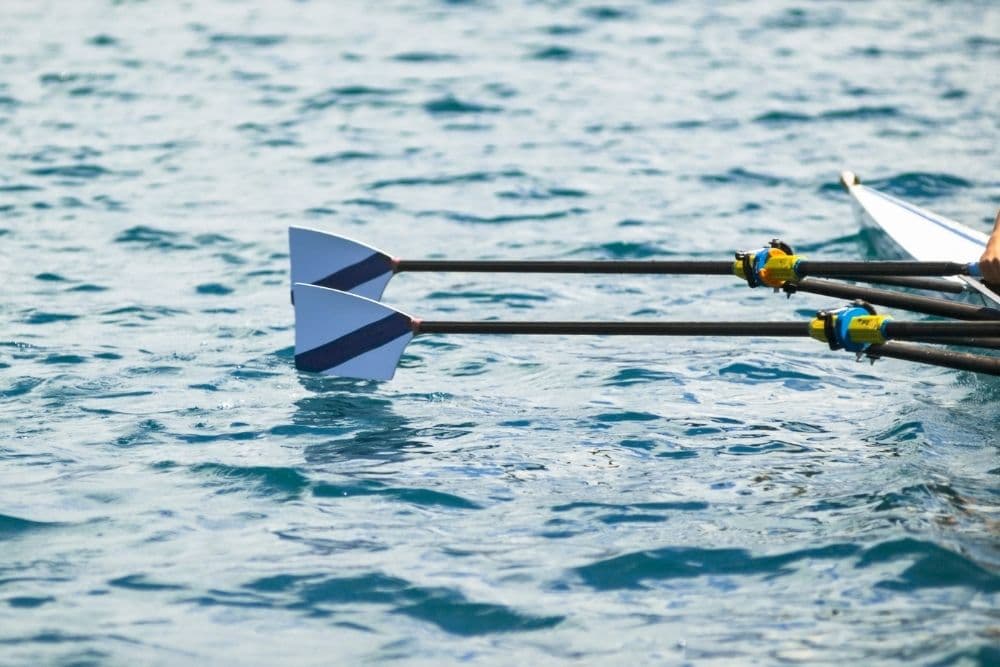
If you’re using a trolling motor, you won’t want to rely on it alone. If your trolling motor is damaged or if the battery dies while you’re in the middle of a lake, you don’t want to find yourself swimming back to shore.
Always keep a set of oars with your inflatable pontoon boat. Most boats will have built-in oar locks that will allow you to stow the oars until you need them. You’ll want to make sure they’re stored properly so that they don’t throw off the balance of the pontoon.
5. Evenly Distribute the Weight
Too much weight to the front, back, or one side of the pontoon boat may cause it to tip over, or at least to lean heavily under the weight.
Keep in mind the amount of gear you have, the weight of any equipment such as trolling motors, and of course, yourself and any passengers. Make sure all of this weight is evenly spread out around the boat so that it will maintain the proper center of gravity.
Also, if you have to stand up to cast a line or reach a piece of gear, it’s a good idea to secure your boat with an anchor. Never stand or try to move around more than you need to.
6. Know the Weight Limit
Each pontoon boat will have its own weight limit. You should never exceed this limit. In fact, it’s better to try and stay well below the limit to avoid stressing the boat.
If you do exceed the limit, you will almost certainly capsize. If you push your luck and try to get too close to the limit, the boat will be difficult to maneuver and may sit dangerously low in the water, putting it at a greater risk for sustaining damage.
7. Know How Deep/ Shallow Your Pontoon Boat Can Go
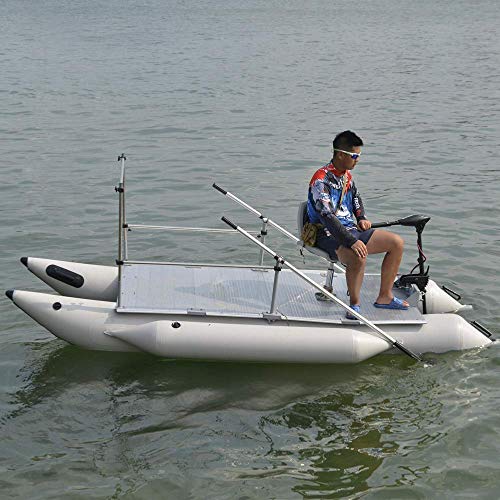
Not all pontoon boats can handle the same water depth. How deep or shallow your boat can go will depend on the water conditions as well as the size and construction of the boat.
Be sure and check your owner’s manual to find out the appropriate water depth for your specific pontoon boat, then stick to waters of that depth.
8. Know How Far Out Your Pontoon Boat Can Go
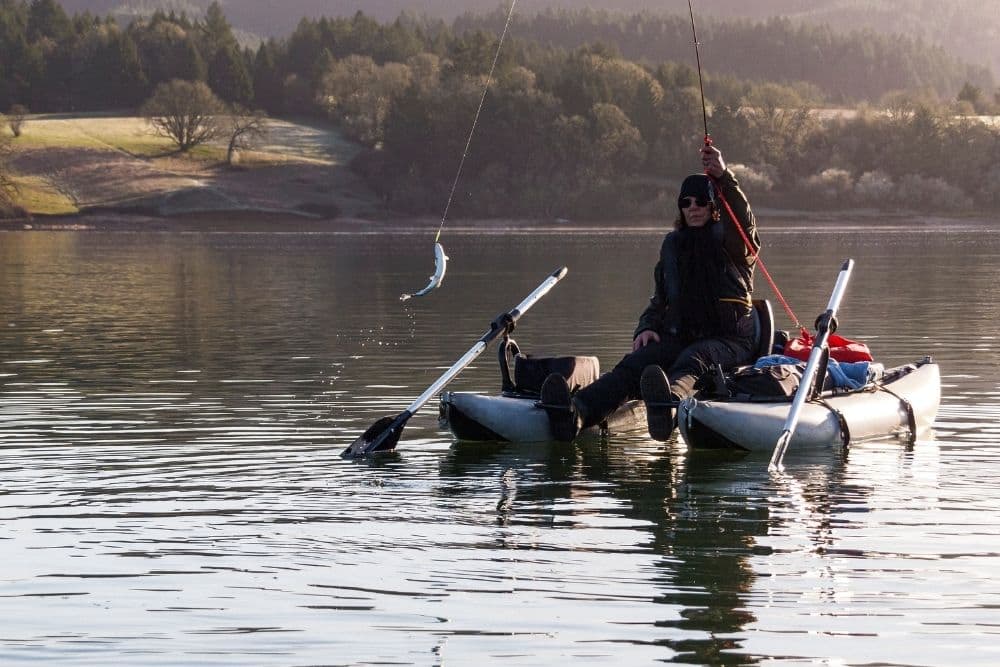
In general, most inflatable pontoon boats can be taken as far as you can safely and comfortably swim back. The farther out you go, the greater your chances of running into rough waters, sudden storms, and other problems.
That said, try and find out how far your specific pontoon boat can go. Some are made of more durable materials that can take a bit more of a beating. How far you can go in your pontoon will also depend on your own experience as well as the water depth and conditions.
9. Let Someone Know Your Plans
Especially if you’ll be out on the water by yourself, it’s a good idea to tell someone where you’ll be and how long you’ll be gone. Let them know your plans ahead of time, and let them know once you’re back home.
Telling someone your plans will provide an extra layer of security, as they will be able to notify first responders if something goes wrong while you’re out boating.
10. Keep an Eye on the Weather
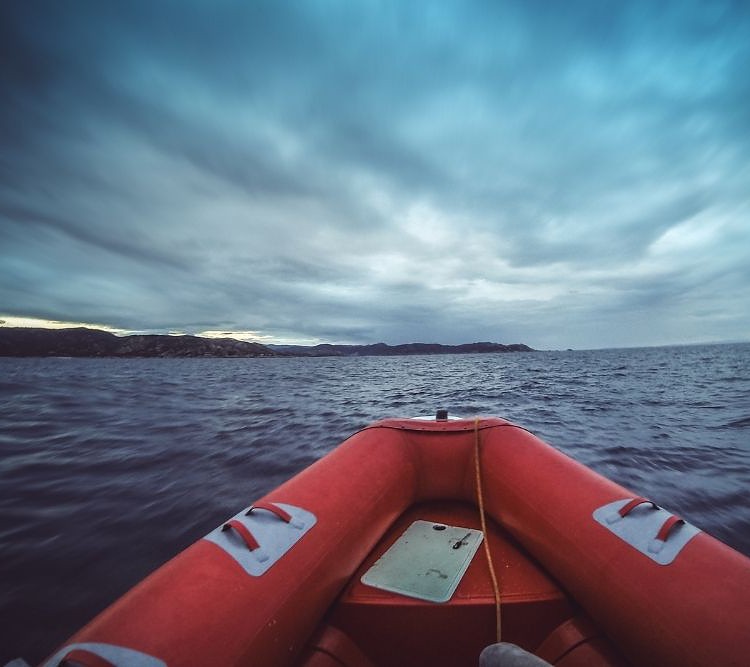
Know the weather forecast before taking your boat out, and don’t go on the water if there are thunderstorms or high winds expected.
Even knowing the forecast ahead of time, stay alert while you’re out on the water, as conditions can change pretty quickly and you don’t want to be caught in an inflatable pontoon if a storm comes up.
Conclusion
Inflatable pontoon boats are meant to be used in calm waters. As long as you avoid choppy currents and underwater obstacles, you should be perfectly safe in an inflatable pontoon.
It’s also important to follow the safety tips outlined in this guide, as they will help you avoid problems and will make sure you’re prepared should any accidents occur.
Happy boating!

Sarah Hood has been writing for Anchor Travel since 2021. When she’s not writing, she enjoys cooking, singing, and spending time in the great outdoors.


